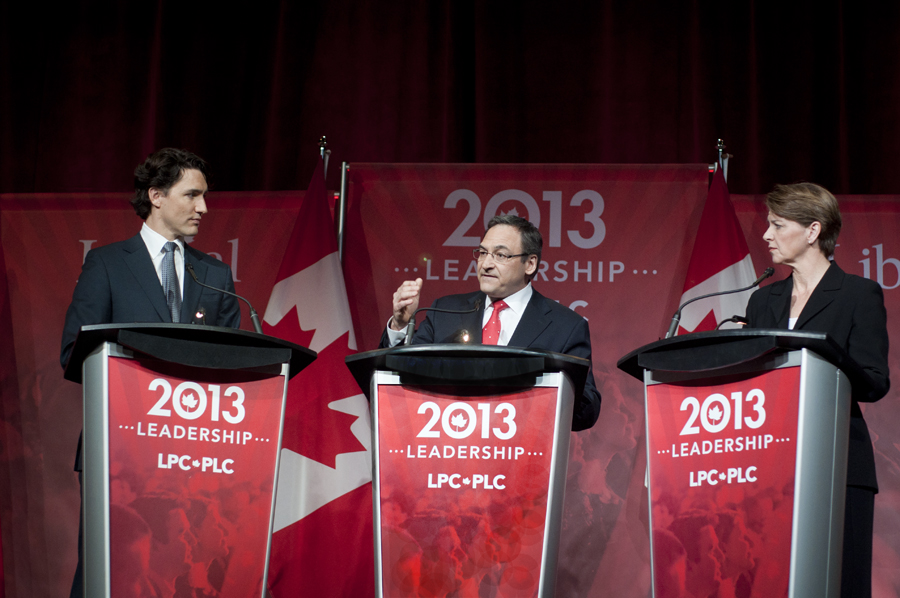On Mar. 23, liberal leadership candidates – Martin Cauchon, Deborah Coyne, Martha Hall Findlay, Karen McCrimmon, Joyce Murray, and Justin Trudeau – met for the fifth and final debate of the 2013 federal Liberal Party of Canada leadership race at the Palais des congrès in Montreal.
The afternoon featured several three-way debates among candidates, addressing questions submitted by the Liberals from across Quebec. Afterwards, candidates were given the opportunity to pose questions to each other in numerous one-on-one debates.
A particularly divisive topic was the possibility of party co-operation to avoid vote-splitting in the next federal election. Murray advocated co-operation among the Liberal Party, the New Democratic Party (NDP), and the Green Party, in order to defeat the Harper government in 2015.
“It’s time to set aside politics based on division … I’m the only candidate who has put forward a concrete plan for co-operation that will avoid vote splitting,” Murray said.
To avoid what Trudeau called a “hodge-podge that’s about winning at all costs,” Hall Findlay and Trudeau argued against uniting the three parties.
“I understand we all want to replace Stephen Harper,” Hall Findlay said. “[But] we are in third place … [so] if this were to work, we would replace Stephen Harper with [NDP leader] Thomas Mulcair.”
Other major topics at Saturday’s debates included youth, seniors, energy, the environment, international development, and legal justice.
Issues facing youth
Candidates put forward their plans to address the financial issues students face.
“One of the main things we have to do is address student debt,” McCrimmon said. “If we don’t make the investments, we’re not going to prevent the tragedy of having a generation that doesn’t have the same opportunities that their parents do.”
Hall Findlay wants to give provinces more autonomy over education issues. This proposition serves as a response to the federal government’s plan to require the private sector to put forth $5000 for each employee’s training—an amount that the provincial and federal governments would be required to match.
“I like the idea of matching educational institutions and the private sector; that actually makes a lot of sense,” Hall Findlay said. “But it doesn’t make sense to never have a conversation with the provinces before you go and start ramming this stuff down [their] throats.”
Coyne emphasized the federal government’s role in specifying how provinces are to use the federal funds allotted to them.
“There’s a lot of money that goes to universities for research—[perhaps] we’ve got to get … the provinces [to] say, ‘Look, this [money] is for bringing down the cost, for looking at the costs of students attending post-secondary, it’s for expanding access, and it’s for ensuring that innovative things are going on,’” she said.
Candidates also addressed the low youth turnout rate in elections, and discussed ways to make politics more relevant to younger generations.
Trudeau noted that young people are more aware of political issues than ever before.
“When you look at demonstrations for example … a few days ago, the first anniversary of the demonstrations here in Montreal by young people … [shows] that [they] want to forge the world around them, but they really don’t think that politics is the right way of doing this,” Trudeau said. “We aren’t building the world they dreamed of, so we have to get them involved in politics; and that’s how things will change.”
Canada’s fossil fuels
Murray positioned herself against Hall Findlay’s support of the Canadian Oil Sands industry.
“I presented in the House [of Commons] a bill to prevent crude oil traffic on the west coast because of the risk of oil spills, and you vocally opposed my bill,” Murray said to Hall Findlay. “Are you supporting the interests of Calgary’s oil community over the interests of British Columbians?”
Hall Findlay restated her stance in favour of maintaining Canada’s oil industry for the sake of the economy.
“The prosperity that we derive from the Oil Sands benefits all Canadians, and we suffer right now a price discount of about 30 per cent because we can’t get that oil to our world markets,” Hall Findlay responded.
Liberals in Quebec
Cauchon and Trudeau debated how to best restore support for the Liberal Party in Quebec. The only two male candidates agreed on the need for the inclusion of Quebec in Canadian politics, but proposed different ways of doing this.
“We have to ensure we have a long-term view with a position on federation … which will ensure that one day we can bring Quebec into the constitutional family,” Cauchon said.
However, Trudeau suggested that Quebecers were more concerned with issues other than signing the Constitution.
“For far too long we’ve tried to buy Quebec, rather than tried to get them involved … in building … [a] prosperous, united country,” Trudeau said.
Closing remarks
The debates ended with a reminder that the next and final event in the Liberal leadership race will be the candidates’ speeches in Toronto on Apr. 6—the day the voting period opens. The new leader will be announced when polls close on Apr. 14.
Mike Crawley, president of the Liberal Party of Canada, expressed excitement over the number of Canadians involved in this election.
“This is the leadership race within the history of this party that has had the greatest participation,” Crawley said.
Of the 300,000 Canadians who signed up as supporters of the Liberal Party, less than half have completed the additional step of registering to vote. The majority of registered supporters are over the age of fifty, and Quebec contains just over one tenth of all supporters.








